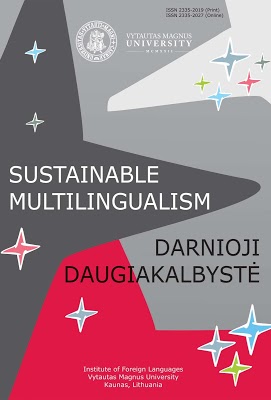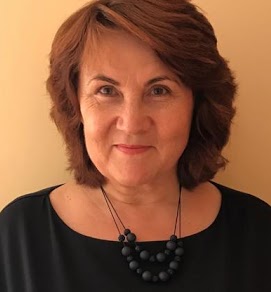Sustainable Multilingualism 2019
24-25 May, 2019
Kaunas, Lithuania
The conference aims at bringing together scholars and language education professionals to share their research insights and discuss the issues relevant to the development of individual and societal multilingualism, including language policy, linguistic human rights, plurilingual pedagogy and language education in higher education.
KEYNOTE SPEAKERS
WORKSHOP
CONFERENCE TOPICS
Submissions are welcome in (not limited to) the following areas:
- Language policy
- Less widely taught languages
- Issues in minority language education
- Language teaching methodology in multilingual and multicultural environment
- Cultural challenges
- Challenges for Identity
- Multilingualism for business and in business
- Multilingualism and educational mobility
- Non-formal and informal development of plurilingual competence
- Innovations in language education
- Content and Language Integrated Learning
- Plurilingual pedagogies and language sensitive teaching
- Literature and multilingualism
- Issues in translation in multilingual environment
5 REASONS TO ATTEND OUR CONFERENCE
- Meet in person world-known researchers in linguistic human rights and outstanding language policy researchers and developers
- Share your research insights within international community
- Discuss current issues of multilingualism with members of international community
- Strengthen the existing and establish new partnerships in the international research and education community
- Visit Lithuania – one of the three Baltic states, the country where the oldest surviving Indo-European language is spoken
CALL FOR ABSTRACTS & REGISTRATION
You are invited to contribute and submit your abstracts in both formats:
- In person: oral or poster presentations.
- Virtually: if you cannot attend in person.
Registration and abstract submission open:
1 November, 2018
Deadline for registration and abstract submission:
1 February, 2019.
Notification of acceptance: 18 February, 2019.
CONFERENCE FEES
Participation fee (conference packet, coffee-breaks, free Wi-Fi):
- Early payment: 19 February – 18 March 2019 – 80 €
- Standard payment: 19 March – 18 May 2019 – 100 €
- Late payment: 19 May – 23 May 2019 – 120 €
- Fee for virtual presentation (without attending the conference in person): 60 €
- Fee for attending the conference without presentation: 30 €
- Members of Language Teachers’ Association of Lithuania and Students: 50% discount
- Social programme: 60 € (Kaunas sightseeing tour – 15€, reception dinner – 45€)
Participation fee shall be transferred to VMU account:
BANK NAME: AB SEB bank
SWIFT Code: CBVILT2X
ACCOUNT NUMBER:
LT04 7044 0600 0284 8625
PURPOSE OF PAYMENT: SM 2019 Conference fee
PUBLICATIONS
All abstracts will be published in an online book of abstracts with an ISBN number.
The selected papers will be published in the international scientific journal Sustainable Multilingualism (www.uki.vdu.lt/sm), indexed in MLA.
Since 2017, Sustainable Multilingualism is published by SCIENDO (former De Gryuter Open).
Print copy: ISSN 2335-2019 Online copy: ISSN 2335-2027
Journal website: http://uki.vdu.lt/sm
Authors of accepted conference contributions may submit their full papers to be considered for publication in the 15th issue of Sustainable Multilingualism, November 2019. Deadline for manuscript submissions is 1 July, 2019.
Conference email: uki@vdu.lt
Conference Facebook: VMU Sustainable Multilingualism
CHAIR OF THE CONFERENCE
Vytautas Magnus University, Lithuania;
Professor at the Institute of Foreign Languages (IFL), Vytautas Magnus University (VMU)
Sustainable Multilingualism (uki.vdu.lt/sm), Editor in Chief
Chair of Sustainable Multilingualism Conferences since 2011
Linkedin: https://lt.linkedin.com/in/nemira-ma%C4%8Dianskien%C4%97-8363aa62
ORCID: https://orcid.org/0000-0003-0412-9584
SCIENTIFIC COMMITTEE
- Anne-Marie Barrault-Méthy, University of Bordeaux, France
- Vilma Bijeikienė, Vytautas Magnus University
- Beatrice Boufoy-Bastick, West Indies University, Trinidad and Tobago
- Servet Çelik, Trabzon University, Turkey
- Manuel Célio Conceição, University of Algarve, Portugal
- Aurelija Daukšaitė, Vytautas Magnus University
- Roma Kriaučiūnienė, Vilnius University, LKPA, Lithuania
- Ulrike Kurth, Westfalen-Kolleg Paderborn, Germany
- Michael Lönz, Ruhr-Kolleg Essen, Germany
- Nemira Mačianskienė, Vytautas Magnus University
- Manfred Malzahn, United Arab Emirates University, United Arab Emirates
- Javier Martos Ramos, University of Sevilla, Spain
- Alida Samusevica, Liepaja University, Latvia
ORGANIZING COMMITTEE
Vytautas Magnus University:
- Jūratė Andriuškevičienė
- Jovita Daukšytė
- Gintarė Gelūnaitė-Malinauskienė
- Aušra Jankauskaitė
- Daina Kazlauskaitė
- Vitalija Lanza
- Sigitas Lūžys
- Almantė Meškauskienė
- Daiva Pundziuvienė
- Martynas Prūsaitis
- Rima Sabaliauskienė
- Jurgita Šerniūtė
- Žieda Tamašauskaitė
- Vigilija Žiūraitė
CONFERENCE ADMINISTRATIVE SUPPORT GROUP
- Jurgita Šerniūtė – administrator; jurgita.serniute@vdu.lt (contact in English)
- Gintarė Gelūnaitė-Malinauskienė – administrator; gintare.gelunaite-malinauskiene@vdu.lt (contact in German)
- Almantė Meškauskienė – deputy director; almante.meskauskiene@vdu.lt (contact in Russian)
- Vilma Bijeikienė – director; vilma.bijeikiene@vdu.lt (contact in English, Russian, German)
- Nemira Mačianskienė – chair of the conference; nemira.macianskiene@vdu.lt (contact in English, Russian)
- Rima Sabaliauskienė – lecturer; rima.sabaliauskiene@vdu.lt (contact in Spanish)
- Martynas Prūsaitis – IT specialist; martynas.prusaitis@vdu.lt (contact in Lithuanian)







